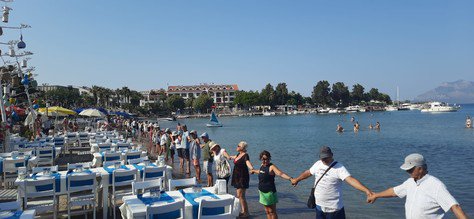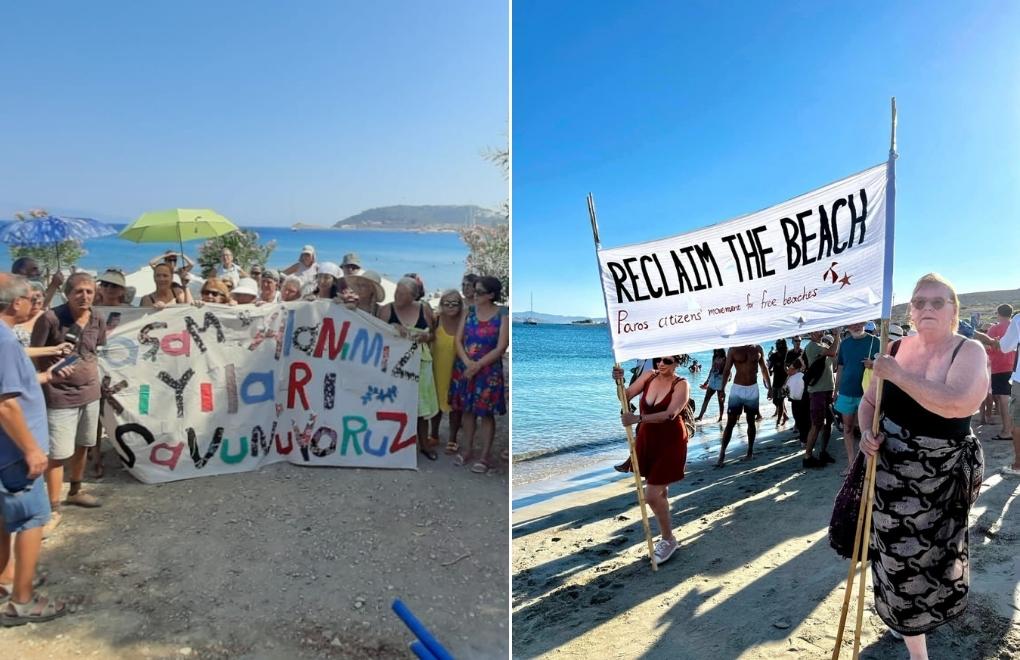Click to read the article in Turkish
On both sides of the Aegean Sea, in Greece and Turkey, two separate movements have emerged with a shared goal: to combat the commercialization of the shores.
In Greece, the "Towel Movement" and in Turkey, the "The Initiative for Datça Without Sunbeds," both advocate for the protection of beaches as public spaces. The former has turned into a countrywide movement while the latter remains a local initiative.
The Towel Movement was established in early August with the aim to "reclaim the coasts" from what they label as "occupying" commercial enterprises. The movement took root on Paros Island and quickly spread to Naxos, Corfu, Halkidiki, and beyond. Protesters carrying banners reading "Take Back the Shores" marched in solidarity.
Thousands of signatures were collected in support of people's free access to beaches and the closure of unchecked exploitative businesses.
Notably, the movement achieved success on Paros Island, leading to the closure of three companies operating on Santa Maria Beach. Kostis Hatzidakis, the Minister of Finance, ordered the police to patrol the beaches and prevent illegal businesses, saying, "We will not yield our beaches to anyone."
According to the Greek Constitution, all beaches are public. Also, free access to the sea should be ensured, and organized beaches must allocate free space for swimmers, including at least a 5-meter-wide open area from the coastline. Moreover, umbrellas, beach chairs, and other recreational equipment provided by businesses cannot exceed 60% of the allocated area and 30% of the total beach area.
Protesters fined in Turkey
In Turkey, citizens have also reacted against the encroachment of commercial enterprises on beaches, inspired by the Greek movement. The "Initiative for Datça Without Sunbeds" emerged in the southwestern district of Datça in Muğla province.
Out of the 110 Blue Flag beaches in Muğla, only nine are open for citizens to use freely. The local community came together in March 2023 when an establishment began constructing a beachfront and pier in Datça's Özbel neighborhood. The residents successfully halted the construction, rallying under the motto "The shores belong to the public."
Following the success of this protest, the initiative was formed. It is currently organizing protest demonstrations in Datça against the leasing of their shores to businesses, particularly emphasizing the obstruction of public access to the sea.

However, the Datça District Governorship recently prohibited members of the initiative, including Melda Omay, Sedat Yağcıoğlu, and Baki Sarıkaya, from placing tables and chairs on the beach after they protested the leasing of a 264-square-meter area to Palaia Hotel. While the ban was imposed on table and chair placement, the district governorship refrained from prohibiting beach access, in line with the Constitution and Coastal Law.
Additionally, all beaches in Muğla are now under the responsibility of the Muğla Environmental Conservation and Education Foundation (MUÇEV). MUÇEV is a joint venture between the Muğla Municipality Foundation and the Turkey Environmental Protection Foundation (TÜÇEV) under the Ministry of Environment and Urban Planning. Municipalities' authority over beaches has been transferred to MUÇEV, which commercializes the beaches through tenders.
Coastal preservation efforts in Çeşme
In Çeşme, İzmir locals are also engaged in a battle against the commercialization of Gücücek Cove.
Established in 2017, the Gücücek Cove Preservation and Improvement Association (GÜDODER) had initially submitted a bid to safeguard the cove. However, they later deemed the offered 56 million Turkish lira as an unfeasible amount. The association is now collaborating with civil society organizations to advocate for the cancellation of the tender.
In pursuit of this cause, Çeşme residents gathered in the town center on August 8th for a protest march. During the demonstration, citizens recounted events from 2017 when a company, which had leased the beach, carried out construction work using heavy machinery and erected stone walls along the shoreline. (HA/VK)




